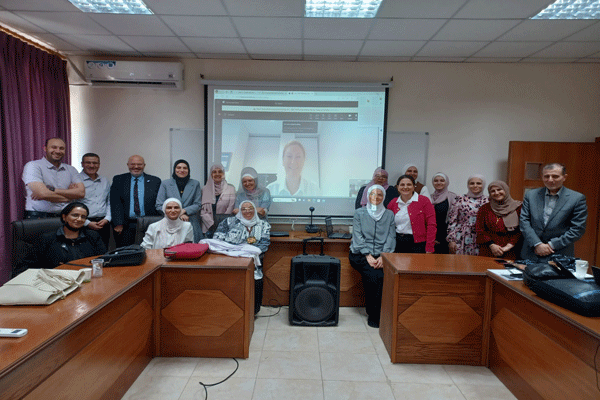
JBI welcomes new Jordan entity
Accelerating evidence-based healthcare and health equity in the Middle East
JBI is thrilled to welcome its first JBI Collaboration Entity based in Jordan, The University of Jordan Evidence-Based HealthCare, which is part of the Public Health Institute and the School of Nursing at the University of Jordan in Amman. Established in 1962, The University of Jordan is the first and largest University in the country, and its nursing program is ranked first in the Arab world.

Professor Diana Arabiat, Director of the new entity, leads its mission to promote evidence-based healthcare, supported by a team with diverse expertise and deep knowledge in their respective fields. The multidisciplinary team brings research interest and expertise in cultural competency—an especially valuable asset in the context of Jordan. Jordan is the world’s second-largest host of refugees per capita, and its healthcare response is widely recognised for its resilience, and for being a model for coordinated, inclusive, and sustainable humanitarian care.
"We as new members of the JBI Collaboration have great opportunities to ensure scientific knowledge is expanded and applied in Jordan and beyond, and produce high-quality evidence synthesis that can be applied to improve quality of health care and improve patient outcomes", says Prof Arabiat.

The team of nurses, clinicians and academic educators is undertaking a range of research activities and clinical research, both nationally and internationally to promote and enhance the development and dissemination of evidence-based practice for a wide variety of health conditions, including diabetes. Diabetes is a public health concern in Jordan, with about 20% of adults aged 45–69 living with diabetes, according to the World Health Organization’s 2019 national STEPS survey. These rates are double the global average prevalence of diabetes among adults 20 to 79 years old age, at 10.5% in 2021, according to the International Diabetes Federation.
The team will also work collaboratively on several systematic reviews and meta-analyses related to gender and equity in healthcare.
Prof Arabiat says that the team is ideally placed to impact the knowledge and skills needed to support the wellbeing of children and women’s health in Arabic-speaking communities. Work still needs to be done to achieve gender equality in Jordan. As per data from the UN Women, it is important to work on the current gender gaps to achieve gender-related sustainable development goal commitments in Jordan. There have been significant improvements in maternal care in Jordan over the last few decades. For example, the 2023 Jordan Population and Family Health Survey indicates that over 98% of births are now attended by skilled health personnel, and nearly all women receive antenatal care. Despite the improvements in healthcare for women, gender equity in health remains a challenge in Jordan, where social norms, economic disparities, and limited decision-making power restrict women's access to comprehensive care, especially in rural areas.
The JBI Collaboration is the largest global collaboration to integrate evidence-based healthcare within a theory-informed model that brings together academic entities with hospitals and health systems. The University of Jordan’s membership in the JBI Collaboration bridges global evidence and local practice in the Middle East. Jordan faces a heavy burden of noncommunicable diseases such as diabetes and serves diverse refugee populations with unique cultural and linguistic needs. The latest JBI Collaboration Entity will build capacity for evidence synthesis and implementation, promote equity and inclusion, and accelerate regional health improvements to contribute to JBI’s mission of better evidence for better outcomes and a brighter future for all.
We warmly welcome our new JBI Collaboration Entity and look forward to supporting the exceptional work they will do to enhance healthcare outcomes in Jordan and beyond.
References
Department of Statistics. (2023). Jordan Population and Family Health Survey 2023: Summary Report.
International Diabetes Federation. (2021). IDF Diabetes Atlas (10th ed.).
UN Women. (2022). General Framework for Gender Equality in Jordan
UNHCR. (2025, March). Jordan. United Nations High Commissioner for Refugees.
World Health Organization (WHO). (2023). Promoting the health of refugees and migrants: Jordan country report, 2023.
World Health Organization. (2019). Jordan national STEPwise survey (STEPS) for noncommunicable diseases risk factors 2019. WHO Regional Office for the Eastern Mediterranean